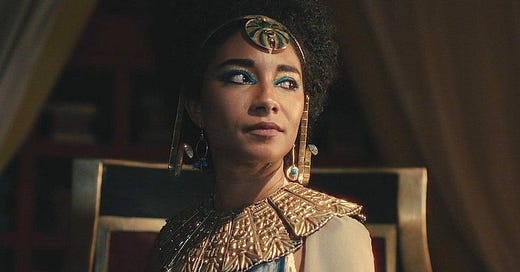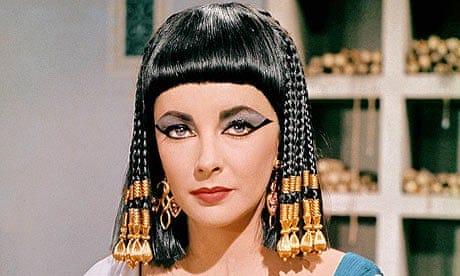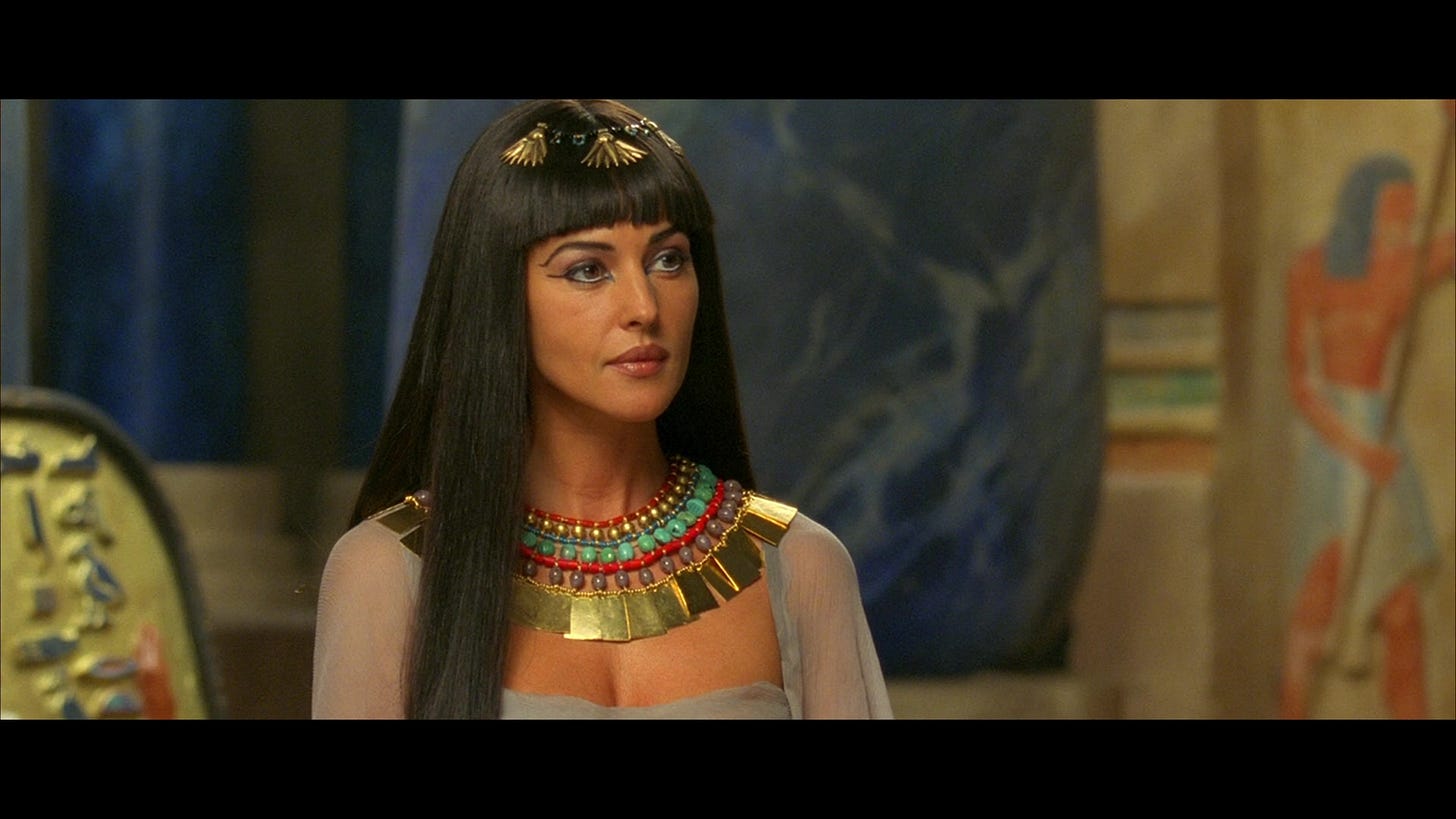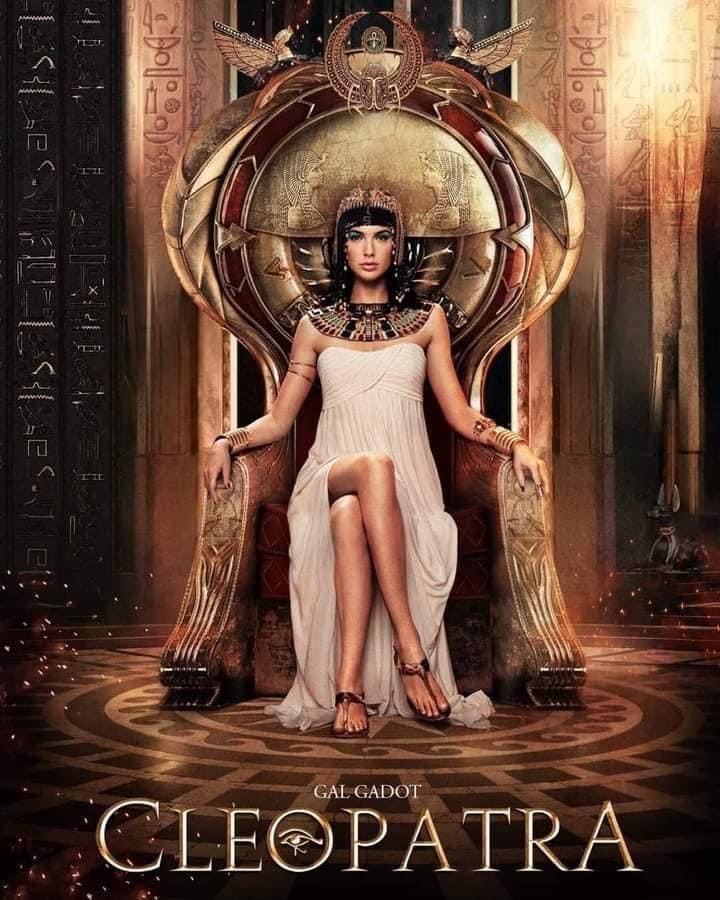One of the strange things about doing history is that it’s either really hard to get people worked up about it, or much too easy.
The easiest - or most reliable - way of all to get otherwise uninterested people into a state of righteous engagement about history is this:
Write a script for a historical TV show.
Get Netflix or another broadcaster to commission it.
Do some controversial race-based casting.
Feet up, spark a fat one, watch the internet burn down.
Believe me, I know whereof I speak.
The latest example of this concerns Cleopatra. The long-dead last of the Ptolemaic rulers of Egypt has been a person of interest to artists, writers and dramatists literally since the moment she died of (possible) snake poisoning in August 30BC.
Her next screen outing comes from Netflix, whose drama-documentary franchise African Queens ‘does’ Cleopatra in a four-part series dropping on May 10th. African Queens is overseen by Jada Pinkett Smith. The actress who plays Cleopatra is Adele James.
Here she is:
And here, for reference, is another famous screen Cleopatra:
But hold on, because other Cleopatras are also available, such as:
And, possibly, at some point:
There are plenty more out there, if you have Google and a spare five minutes.
Not surprisingly, the decision to cast Adele James as Cleopatra has made a ton of people super mad. In Egypt, some hack lawyer has filed a legal complaint accusing Netflix of ‘erasing the Egyptian identity’.
On social media, many newly minted experts in the exact racial heritage of the Ptolemies have been lining up to take shots at James, much to the poor woman’s chagrin.
[^^Sorry, no click-through to the Twitter account here, the Twitter-Substack war means we can’t do that any more. Link here.]
And many many many news outlets have reported on this story, knowing as they do that any article which links 'race shit’ with ‘TV shit’ with ‘history shit’ has a decent chance of catching eyeballs and therefore ad spend.
The director of the new show, Tina Gharavi, has written a piece for Variety, defending her decision to cast James.
In it, Gharavi asks: ‘why shouldn’t Cleopatra be a melanated sister?’ She also states that her decision was ‘a political act’, and argues that it was a response to inferior casting decisions made in the past.
‘For me, the idea that people had gotten it so incredibly wrong before — historically, from Theda Bara to Monica Bellucci, and recently, with Angelina Jolie and Gal Gadot in the running to play her — meant we had to get it even more right.’
In part Gharavi is right. In part she is absolutely wrong.
She is right with the rhetorical question. There’s no reason why a black or mixed-race woman shouldn’t play Cleopatra.
I mean, obviously.
If your kid ever appeared as Mary, Joseph, a shepherd or the donkey in a Nativity play and you let that happen without a) making a systematic historical enquiry into the specific ethnicity of that real Biblical character and b) withdrawing your kid and picketing the kindergarten if they didn’t cast the whole show precisely to match, then you agree.
Acting is acting. It’s about pretence and make-believe.
Yet as happens so often, rightness bleeds so rapidly into wrongness that one wonders if it was just a lucky shot.
Because having established a principle of freedom to cast a black woman as Cleopatra, Ghavrahi then cannot resist claiming that her free choice is in fact the only right choice.
‘Incredibly wrong?’
No. Acting being acting, there is also no good reason why Gadot, Jolie, Taylor or any of the rest of these non-black women can’t play Cleopatra too. The same rules apply. Acting is acting. It’s about pretence and make-believe.
It does not somehow ‘change history’ to make these casting decisions one way or the other. It does not ‘correct history’ when you ire this actress because you think she’s somehow more ‘race authentic’ than the next girl in line.
It doesn’t make a blind bit of difference to history. Not a jot. You can’t be more right or more wrong in this regard. That is a category error. You have confused dippy TV drama for some sort of time-travelling social justice machine.
Now of course, a certain casting decision in any given historical TV show might well piss you off. And it might do so for one of three very different reasons.
It might piss you off to see a black woman play Cleopatra because somewhere deep down you believe black people should stay in their lane and not do things you either explicitly believe or implicitly assume are reserved for white people.
It might piss you off to see a white woman playing Cleopatra because you think the whole of the entertainment industry ought to be a vehicle for ‘political acts’ of cultural and social restructuring at the expense of all other goals and you resent any deviation from dogma.
It might piss you off to see any person playing any historical figure with whom they do not share the same race, sexuality, gender-identification, etc etc, because you are insane, you believe in destroying the first principles of acting, you have lost the faculty of critical reasoning, or at least the ability to reason a position through to a general conclusion, you have drunk all the twenty-first century Kool Aid now, it’s time for you to go home.
I believe it ought to go without saying that all three of these positions are bad and wrong. But all three are fashionable, in their own circles.
And of course, it is extremely good for business to wind people up.
It is very good business for TV producers to pursue progressive casting agendas that pander to the prevailing orthodoxies in their industry, while simultaneously guaranteeing free publicity in the form of articles slamming those same casting agendas when the show is about to launch.
It is very good business for old media and social media companies to have overheated stories about history, race and television flowing regularly through the ether, keeping people angry and traffic high and advertising bucks coming in.
It is very good business for historians to have a reason to pop up and pontificate on how right or wrong a TV production touching on their area of expertise is.
In that sense, everyone’s a winner - with one exception.
That exception is you, dear history lover, if you are lured into the elephant trap of believing that casting in historical drama is a matter of grave concern or existential importance, either to the present or the past.
So remember:
Acting is just messing around.
It is the prerogative of dramatists and artists to take history and bend it over the bramble bush.
Cleopatra is dead, and whether Adele James or Andrew Tate plays her matters not a whit to the facts and importance of her life.
TV buttons have an off-switch.
The wisest words yet written about this Cleopatra stuff (my own aside, natch) are those of Adele James herself:
‘If you don’t like the casting, don’t watch the show.’
This is a decent variation on the old Shirley Jackson humdinger.
Tattoo that on my heart, baby.
I’m off to LA and New York next week. Expect your weekly despatch from there. Thanks, as ever, for listening.










We"re 20-odd comments in and still nobody has mentioned Jesus Christ Superstar?! Fifty years ago, Christ was cast inthe film as white, blonde and blue-eyed. Do we say now that this doesn't matter (à la the examples of Cleopatra and Anne Boleyn), or is this different because Christ has for centuries been painted as a white person and so the film is another example of a biased rendition?
Casting is one thing. We've been casting people who were not the same race as the person or character probably since the beginning of drama. Let's not get into the history of boys playing women and the history of drag, though we supposedly get the word drag from the sound their dresses made on the stage during Shakespeare's time.
My issue is to say that someone who was mostly inbred Macedonian‐Greek was African, when she probably wasn't, misses actual African women who ruled Egypt and other parts of Africa. We need to hear and read about these women. We hear about interesting European women more than Asian, African, Indigenous, etc. women.